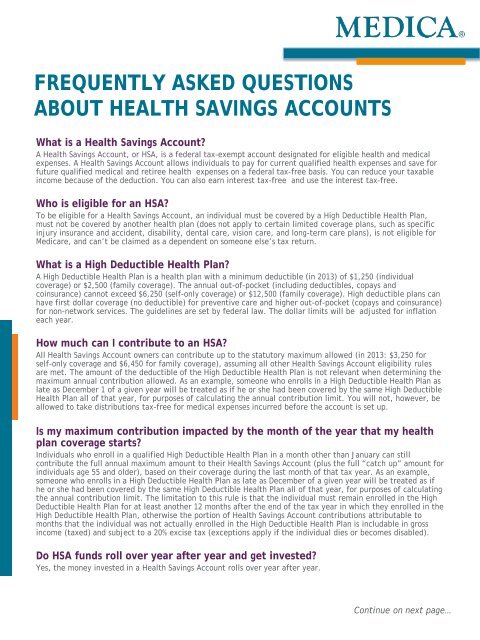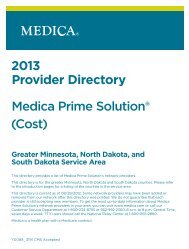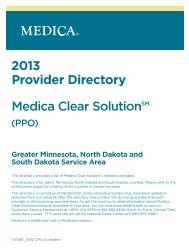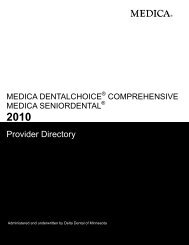HSA FAQ - Medica
HSA FAQ - Medica
HSA FAQ - Medica
Create successful ePaper yourself
Turn your PDF publications into a flip-book with our unique Google optimized e-Paper software.
FREQUENTLY ASKED QUESTIONSABOUT HEALTH SAVINGS ACCOUNTSWhat is a Health Savings Account?A Health Savings Account, or <strong>HSA</strong>, is a federal tax-exempt account designated for eligible health and medicalexpenses. A Health Savings Account allows individuals to pay for current qualified health expenses and save forfuture qualified medical and retiree health expenses on a federal tax-free basis. You can reduce your taxableincome because of the deduction. You can also earn interest tax-free and use the interest tax-free.Who is eligible for an <strong>HSA</strong>?To be eligible for a Health Savings Account, an individual must be covered by a High Deductible Health Plan,must not be covered by another health plan (does not apply to certain limited coverage plans, such as specificinjury insurance and accident, disability, dental care, vision care, and long-term care plans), is not eligible for<strong>Medica</strong>re, and can’t be claimed as a dependent on someone else’s tax return.What is a High Deductible Health Plan?A High Deductible Health Plan is a health plan with a minimum deductible (in 2013) of $1,250 (individualcoverage) or $2,500 (family coverage). The annual out-of-pocket (including deductibles, copays andcoinsurance) cannot exceed $6,250 (self-only coverage) or $12,500 (family coverage). High deductible plans canhave first dollar coverage (no deductible) for preventive care and higher out-of-pocket (copays and coinsurance)for non-network services. The guidelines are set by federal law. The dollar limits will be adjusted for inflationeach year.How much can I contribute to an <strong>HSA</strong>?All Health Savings Account owners can contribute up to the statutory maximum allowed (in 2013: $3,250 forself-only coverage and $6,450 for family coverage), assuming all other Health Savings Account eligibility rulesare met. The amount of the deductible of the High Deductible Health Plan is not relevant when determining themaximum annual contribution allowed. As an example, someone who enrolls in a High Deductible Health Plan aslate as December 1 of a given year will be treated as if he or she had been covered by the same High DeductibleHealth Plan all of that year, for purposes of calculating the annual contribution limit. You will not, however, beallowed to take distributions tax-free for medical expenses incurred before the account is set up.Is my maximum contribution impacted by the month of the year that my healthplan coverage starts?Individuals who enroll in a qualified High Deductible Health Plan in a month other than January can stillcontribute the full annual maximum amount to their Health Savings Account (plus the full “catch up” amount forindividuals age 55 and older), based on their coverage during the last month of that tax year. As an example,someone who enrolls in a High Deductible Health Plan as late as December of a given year will be treated as ifhe or she had been covered by the same High Deductible Health Plan all of that year, for purposes of calculatingthe annual contribution limit. The limitation to this rule is that the individual must remain enrolled in the HighDeductible Health Plan for at least another 12 months after the end of the tax year in which they enrolled in theHigh Deductible Health Plan, otherwise the portion of Health Savings Account contributions attributable tomonths that the individual was not actually enrolled in the High Deductible Health Plan is includable in grossincome (taxed) and subject to a 20% excise tax (exceptions apply if the individual dies or becomes disabled).Do <strong>HSA</strong> funds roll over year after year and get invested?Yes, the money invested in a Health Savings Account rolls over year after year.Continue on next page…1
What can distributions from the <strong>HSA</strong> be used for?The amounts can be distributed for either qualified medical or other expenses. If the amount distributed is usedfor qualified medical expenses, then the distribution is free from federal taxes. If the amount distributed is usedfor other than qualified medical expenses, the amount distributed will be subject to income tax and anadditional 20% tax penalty.What happens to the money in your <strong>HSA</strong> when you reach age 65?Once you reach age 65, the amounts can be used for health expenses and to pay health plan premiums. Itcannot be used to purchase a Medigap policy. It can also be used for non-medical expenses, but the amountdistributed will be subject to income tax, but not the penalty tax.Can anyone make catch-up contributions to an <strong>HSA</strong>?Individuals 55 and older who are covered by a High Deductible Health Plan can make additional catch-upcontributions as defined by federal guidelines on a yearly basis (in 2013, the maximum catch-up contribution is$1,000).Are dental and vision qualified medical expenses under an <strong>HSA</strong>?Yes, as long as these are deductible under the current rules. For example, cosmetic procedures like cosmeticdentistry are generally not deductible and would not be considered qualified medical expenses.What are other qualified medical expenses?Here is a partial list of expenses that may be considered qualified medical expenses. Remember that current IRSrules will govern what is actually considered a qualified medical expense. If you have any questions, you shouldreview the IRS rules at http://www.irs.gov/publications/p502/ar01.html or consult the IRS for furtherinformation.• Adoption related medical services• Alcoholism• Ambulance hire• Artificial limbs• Artificial teeth• Bathroom modifications for the disabled• Birth control pills• Braces• Care for mentally disabled child• Chiropractors• Christian Science practitioners’ fees• Coinsurance medical/dental plans• Contact lenses• Costs for physical or mental illness confinement• Crutches• Deductibles under medical/dental plans• Dental expenses• Dentures• Diagnostic fees• Disabled persons’ special schools• Electrolysis• Eyeglasses, including examination fee• Fees of practical nurse• Fees of licensed osteopaths• Hair transplants• Hearing devices and batteries• Hospital expenses• Insulin• Intellectually and developmentally disabled, special home for• Laboratory examinations and tests• Laetrile by prescription• Lead base paint removal for children with lead poisoning• Life fee to retirement home for medical care• Membership fees in association furnishing medical services,hospitalization, and clinical care• Nurses’ fees (including nurses’ board and Social Security taxwherepaid by taxpayer)• Obstetrical expenses• Organ transplant• Orthodontia• Orthopedic shoes• Oxygen• Physician fees• Physician recommended weight loss or smoking cessationprogramsfor specific illness• Prescribed medicines• Psychiatric care• Psychologist fees• Routine physicals and other non-diagnostic services ortreatments• Seeing eye dog and its upkeep• Special communication equipment for the hearing impaired• Special education for the visually impaired• Sterilization fees• Surgical fees• Therapeutic care for drug and alcohol addiction• Therapy treatments• Tuition at special school for disabled• Well-baby care• Wheelchair• X-rays* Please note that <strong>Medica</strong> and its employees are not to be considered replacements for qualified tax advisors. Thisinformation is provided only as a high-level guide and is not intended nor should it be construed as tax or legal advice.2IFB4865-10313





